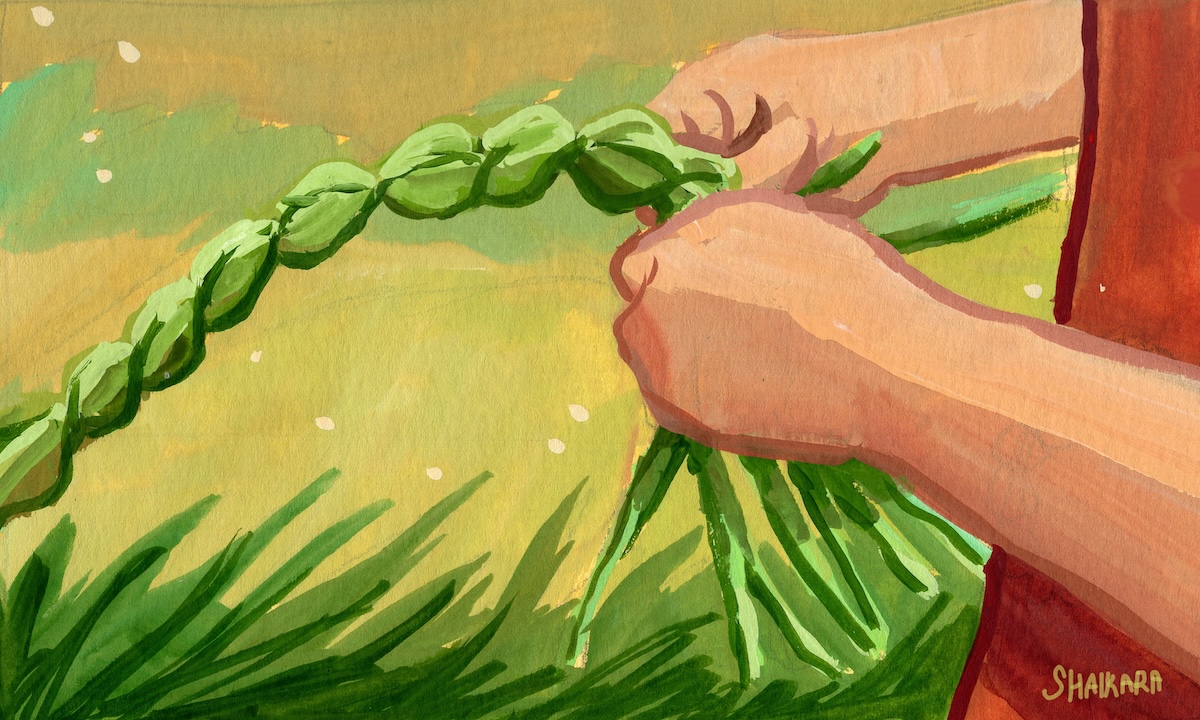Plant Power: Tanya Gluvakov Grows Gardens and Makes Medicine
“Connecting to land helps us remember that we're not as isolated or alone as we might think and how with all the things connected and that remembrance that we can find ourselves again,” says Tanya Gluvakov, a language learner and clinical herbalist. Her family is from Six Nations of the Grand River. She is a mixed Mohawk woman currently living in treaty 18 territory. For the last couple years she has been teaching about herbs and medicines through local school boards and Connected North.
Gluvakov enjoys connecting with people and reminding people how interconnected we are. She also loves to help people get to know plants and build relationships with them. She grows a variety of plants to support immune systems, that help people’s skin, along with traditional sage, sweetgrass, cedar and tobacco. She makes medicines from the plants she grows.
When Gluvakov was growing up, she didn’t have access to education in a classroom setting, but she learned from her aunt, grandmother, friends and family. She continues to learn from community members and from experimentation on her own. “I think it's all about that relationship building and learning about each other, what conditions we thrive in, the types of care that promote growth versus other types of care where you're not paying attention very much,” she elaborates.
The clinical herbalist training Gluvakov undertook has been different from her traditional Indigenous knowledge but she’s found the information to be beneficial to include in her learning. As a continuous learner, she has an ongoing thirst for knowledge, explaining that she continues on her learning journey, “I'm not there yet, and I don't know if I'll ever get to where I want to be, but just keeping that interest and just going forward and learning the best way that we can is all we can do."
Becoming a clinical herbalist wasn’t without challenges. For example, finding space to grow a garden was one obstacle, but with openings for urban gardens in Toronto, the option to sprout in mason jars, balcony gardens, wild harvesting and other options there were opportunities to work around challenges. The other issues she faced were financial, with the high costs of herbal courses. Gluvakov also hopes to see more land-based courses that encourage stewardship, relationship building and treating the land as a relative.
To keep her mental health in check, Gluvakov gets outside, something she considers to be very helpful. She likes to watch the clouds go by, notice the plants, the breeze, the smells and tune out her inner monologue. She tries to get out into a park or even onto a balcony. Getting feet on the ground, lying on the ground or hands in or looking at the earth are practices she encourages. Exploring the outdoors in depth and acknowledging water are things she likes to do. Thinking about everyone’s connection to water has changed her perspective on relationships, connection, and commonalities.

When it comes to inspiration, Gluvakov looks to her aunt who was a medicine person. She witnessed her aunt doing what she does today when she was young. She says that her inspiration comes from “just remembering those who came before us, and then trying to make spaces and places available for those who come after me, just remembering that whatever I do today and the way that I hold myself today will really ripple out into the future, through my kids, through all the relations that I will encounter while I'm here on earth side and through those opportunities to be able to teach people, even in the smallest of ways, or to remind people about that connection and share my own experience, I feel like it can change people's perspective on things.” She hopes in the future people will have easy access to information about plants and food. “Everyone really is my inspiration that's doing this work,” she continues.
Thinking of goals for the future, Gluvakov prefers to take things one day at a time as it’s better for her mental health. She hopes in the future to learn more and share her knowledge with the world, aspiring to do better. With so many worries in the world, she’s reluctant to put more on, preferring instead to dream and aspire.
For youth wanting to work with plants her advice is, “start with the very first plant that shows up for you on your path.” Gluvakov suggests taking things slowly at first and not feeling like you have to do everything all at once. She also recommends volunteering at workshops and community gardens in order to learn.
To inspire Indigenous youth, Gluvakov would like to say, “despite anything that may face us as a challenge, we can do hard things. So we can show up shaky, we can show up nervous, and at the end of the day, we can still do it. We can do hard things."
In connecting to the land, Tanya Gluvakov has found community to share about plants with and to learn from as well. With the teachings from her family and clinical herbalism, she’s found opportunities to grow her knowledge and skills as a medicine woman. Following in the footsteps of her aunt, her feet are in the earth and her heart and mind are open wide.
Thanks to Alison Tedford Seaweed for authoring this article.
Future Pathways Fireside Chats are a project of TakingITGlobal's Connected North Program.
Funding is generously provided by the RBC Foundation in support of RBC Future Launch, and the Government of Canada's Supports for Student Learning program.